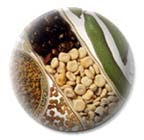
|
Vegetable Seed Production
Current State of the Industry
Seed Companies
Most seed companies do an outstanding job of producing and selling vigorous
seeds of high viability. Most large vegetable seed companies no longer
compete with one another on the basis of seed viability (whether or not
their seeds germinate) but rather on the vigor of seeds (how well they
germinate).
See these images for more information on seed vigor (click image for
large version):
 |
 |
Also the last 50 years has seen much progress in the packaging and treating
of vegetable seeds. Much of the success of seed companies lies with plant
breeders who are constantly developing vegetable cultivars of the highest
quality. In many cases, yields and pest resistance of new cultivars exceed
the old. This is in stark contrast to about 60 years ago when many growers
still saved their own seeds. Today relatively inexpensive, high quality
seeds can be purchased retail, from dealers, via catalog, or over the
web.
Not too long ago each region of the country had at least one and in many
cases several vegetable seed companies that would specialize in developing
cultivars for their region. However, over the years many of these smaller
companies consolidated or ceased operation. This consolidation has paralleled
the decrease in the number of vegetable farms in the US.
The number of companies that actually produce their own seeds and develop
new cultivars has been steadily decreasing over the past 60 years. Like
other industries, the seed industry has seen much consolidation and increased
specialization. For example, some companies do not actually produce seeds
or develop new cultivars but rather specialize only in retail sales. Of
these companies, there are those that specialize in the home garden trade
and others who cater to commercial growers. Some seed companies specialize
in seed production and cultivar development and do not retail the seeds
they produce, while other companies are involved in all aspects of the
seed trade. Several companies do not sell seeds but specialize in treating
seeds produced by other companies. Some companies specialize in specific
crops and wholesales them to companies specializing in retail sales.
Today, a handful of large multi-national companies own many of the vegetable
seed producing companies in the US. Many of the large vegetable seed companies
are multinational. Very few of these companies are privately owned. Many
are owned by other large multinational corporations. For example, Petoseed,
Royal Sluis, Asgrow vegetable seeds and several other seed companies are
part of the Seminis group which used to be an independent company but
is now part of the Monsanto group. Many people consider Monstanto to be
the largest seed producing company in the world.
There are successful small vegetable seed companies as well. The need
for organically produced seeds has created a niche market that is being
filled by some small companies. Certain companies have catered to regional
markets and the need for open pollinated and heirloom cultivars that are
popular with some groups.
|
